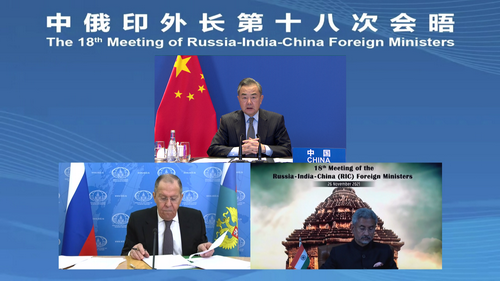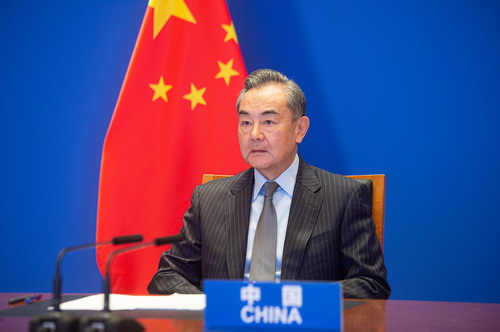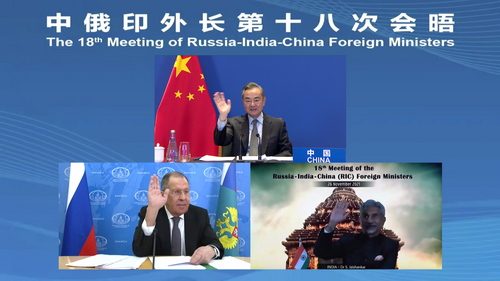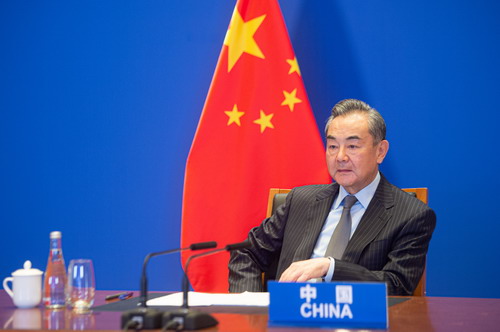Wang Yi Attends Virtual Meeting of Russia-India-China Foreign Ministers

On November 26, 2021, State Councilor and Foreign Minister Wang Yi attended the 18th Meeting of Russia-India-China Foreign Ministers via video link.
Wang Yi said that China, Russia and India are major countries with global influence and the most representative emerging market economies. The three countries share common interests and similar positions in promoting world peace, stability and development, and shoulder important missions and responsibilities. Facing profound changes unseen in a century, the choices made by China, Russia and India not only affect our respective interests, but will also affect the direction of human progress.
Wang Yi said that the Resolution of the Sixth Plenary Session of the 19th Central Committee of the Communist Party of China (CPC) clearly stated that the CPC has the world in mind and always pays attention to the future and destiny of mankind from a global perspective. It correctly understands and handles the relationship with the outside world from the general trend of human development, the general pattern of world changes and the major history of China's development. China is willing to work with Russia and India to continue to carry forward the China-Russia-India spirit of "openness, solidarity, trust, and cooperation", and demonstrate the responsibility as major countries, and play a leading role. China stands ready to cooperate with Russia and India to send positive messages to the world regarding the practice of true multilateralism, the promotion of democracy in international relations, the importance of working together to fight the pandemic, and the need to boost economic recovery and safeguard world peace and stability. The Chinese side is willing to offer China-Russia-India solutions and contribute China-Russia-India strength to a world full of uncertainties.

Wang Yi put forward five suggestions on further promoting China-Russia-India cooperation.
First, we should practice true multilateralism. China, Russia and India should hold high the banner of peace, development, cooperation and mutual benefit and oppose all forms of zero-sum game and "new Cold War" schemes. We should advocate extensive consultation, joint contribution and shared benefits in global governance and make the international political and economic order more equitable. We should lead the international community in strengthening solidarity and mutual trust and building a new type of international relations featuring mutual respect, fairness, justice and win-win cooperation. We should explore a new path for state-to-state interactions featuring dialogue and partnership rather than confrontation and alliance, and build a community with a shared future for mankind.
Second, we should respect the legitimate rights and interests of all countries and the independent choice of development path. The "Summit for Democracy" organized by the United States draws lines based on one country's standards and creates divisions and confrontations, which will only bring negative energy to the world. The United States regards itself as a world leader and requires all countries to follow its leadership, which violates the democratization of international relations. The practice of democracy varies according to national conditions and cannot be a template or a standard. The needs and aspirations of the people are the starting point and ultimate goal of democracy. China, Russia and India have all embarked on the development paths suited to our respective national conditions. We have the responsibility to foster a correct concept of democracy in the world, get out of the "democracy trap" by certain country, and oppose interference in other countries' internal affairs under the pretext of democracy.
Third, we should strengthen global cooperation in the fight against the COVID-19 pandemic. China, Russia and India should continue to support each other's efforts to fight the pandemic, share information on the pandemic and experience in fighting the virus, strengthen joint prevention and control, and minimize the risk of cross-border transmission. We should carry out practical cooperation in the fields of testing methods, therapeutic drugs and vaccine research and development and production, and mutual recognition of standards. We must adhere to scientific origin-tracing of the virus, oppose the politicizing of science and using origin-tracing as a tool, distribute vaccines as a global public good in a fair and reasonable manner, improve the accessibility and affordability of vaccines in developing countries, and jointly build a global community of health for all.
Fourth, we should promote post-pandemic economic recovery. We need to strengthen macro policy coordination, advance trade and investment liberalization and facilitation, maintain a stable and smooth industrial chain, promote the orderly flow of resources and factors of production, and oppose any discriminatory or exclusive practices. Major developed countries should adopt responsible economic and financial policies to avoid negative spillover effects on developing countries. China expects Russia and India to join the Global Development Initiative, and contribute to accelerating the implementation of the UN 2030 Agenda for Sustainable Development and achieving stronger, greener and healthier global development.

Fifth, we should address hotspot issues through dialogue and consultation. We should positively guide all parties and ethnic groups in Afghanistan on the basis of equality and respect, and at the same time urge the Western countries led by the United States to earnestly shoulder their responsibilities and provide humanitarian assistance to Afghanistan. We should encourage the international community to build a united front against terrorism so as to prevent Afghanistan from once again being a hotbed, harbor and source of terrorist forces. We should continue to constructively participate in the political and diplomatic settlement process of the Iranian nuclear issue and work for an early return of the JCPOA to the right track.
Russian Foreign Minister Sergey Lavrov and Indian External Affairs Minister Subrahmanyam Jaishankar believe that strengthening solidarity and cooperation among the three countries is in line with the building of a multipolar world, which has also played a positive role in promoting global peace, stability and economic growth. They said that the three countries should firmly maintain the core position of the United Nations, firmly uphold the principle of sovereign equality, and support true and effective multilateralism. Under the current circumstances, the three countries should step up coordination, speak with one voice, unleash the potential of trilateral cooperation, and jointly tackle global challenges such as the COVID-19 pandemic, climate change and terrorism. Russia and India support China in assuming the rotating presidency next year and are ready to work with China to take the 20th anniversary of the meeting as an opportunity to further enhance the level and influence of China-Russia-India cooperation.
Lavrov also emphasized that the so-called free and open Indo-Pacific region is not an equal partnership. The tradition of the Asia-Pacific region is inclusiveness and harmony, and the diversity of the region should be advocated and promoted. Forming various "small cliques" is a typical Cold War mentality, which aims at destabilizing the regional strategic balance, and the three countries should cope with it together.
After the meeting, the three countries issued a joint communique.

京ICP备18041594号-1
京公网安备 11010202005508号


